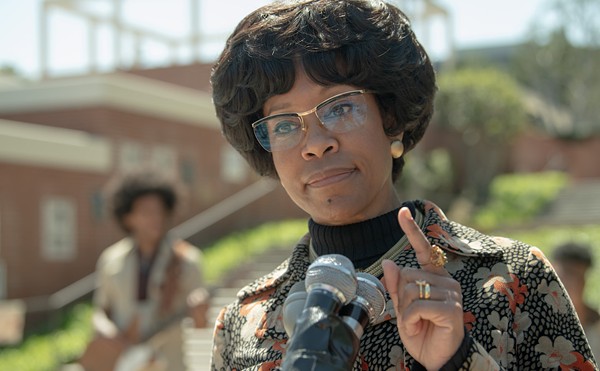Chalk. (PG-13) Trouble paying attention in class, low self-esteem, hormonal confusion, counting the days until summer vacation — and those are just the teachers in director Mike Akel's zippy debut feature about instructors at an Anytown, U.S.A. public high school. Drawn from Akel's (and star Chris Mass') own on-the-job experiences, Chalk opens by telling us that 50 percent of teachers quit within their first three years on the job, then proceeds to show us why in fly-on-the-wall mockumentary fashion, cutting between the classrooms of an introverted first-year history teacher (Troy Schremmer), whose lack of enthusiasm about his subject is contagious; the jovial Mr. Stroope (Mass), who spends more time thinking about the upcoming teacher-of-the-year contest than his own lesson plans (and who, in one priceless moment, kindly begs of one student: "In class, try not to know as much of me"); and a female P.E. coach (Janelle Schremmer), who worries that her job and short haircut will make people think she's gay. Though Akel and Mass share writing credit, Chalk was actually shot in a loose, improvisational manner modeled after the films of Christopher Guest, and its best set-pieces are like devastatingly effective pin pricks made at the Hollywood hot-air balloon of inspirational teacher/coach melodramas. Think of it as To Sir, With Sarcasm. (Scott Foundas) TV
Gracie. (PG-13) In what could be construed as a very expensive home movie, the Shues (siblings Elisabeth and Andrew, of the proud glares and somewhat less reliable acting ability) rally to tell the story of how soccer saved a family in the wake of an eldest son's death. Directed by Davis Guggenheim (An Inconvenient Truth), Gracie draws on several aspects of Shue family history, including the death of their older brother and Elisabeth's determination to play soccer with the boys growing up in New Jersey in the '70s. The title character (Carly Schroeder) idolizes older brother and soccer star Will, whose death sends her family — particularly father and coach (a valiant Dermot Mulroney) — into a tailspin. Gracie's dream is to play on her brother's soccer team and score the big goal for him, but the men (and The Man) have other ideas. Firing on all formulaic cylinders, Gracie is heavy with tidy meaning and mealy morality; the most dubious idea here is that if you don't let a girl play soccer, she just might turn to cigarettes, halter tops, and sex with the starting forward. (Michelle Orange) ARN, CGX, DP, J14, KEN, MR, OF, RON, SP, STCH, TS12
Knocked Up. (R) Reviewed in this issue. (Robert Wilonsky) ARN, CPP, CGX, DP, GL, J14, MR, OF, RON, SP, STCH, STCL, TV
Mr. Brooks. (R) Reviewed in this issue. (Wilonsky) ARN, CPP, CGX, DP, GL, J14, KEN, MR, OF, RON, SP, STCH, STCL, TS12
Paris Je T'aime. (R) Paris, Je T'aime's brimming declaration of love to the City of Lights leaves one breathless but dissatisfied. Paris' quartiers and the rainbow coalition of people who inhabit them are the connective tissue for this spotty omnibus' 18 segments; five minutes each, these trifles come and go before they've registered in the mind. Only Tom Tykwer attempts to redress this constraint by evoking a blind man's romance with an actress as a spastic glitch in time. Isabelle Coixet and Nobuhiro Suwa's contributions are endearingly bittersweet suck-ups to love and death, but both treat the Paris setting as superfluous. Sylvain Chomet, Olivier Assayas, and Alexander Payne more sensitively consider the feelings of elation the city's exquisiteness rouses, while Oliver Schmitz conveys the complex politics of Paris' racial diversity with a heft and economy that evades Walter Salles and Daniela Thomas. Leave it to the Coen brothers to show everyone up with their acerbic Tuileries, in which Steve Buscemi's encounter with a hellish couple inside a Metro station slyly hints at a raison d'être for the Mona Lisa's smile — a symbol for the transfixing allure of the most beautiful city in the world. (Ed Gonzalez) PF





